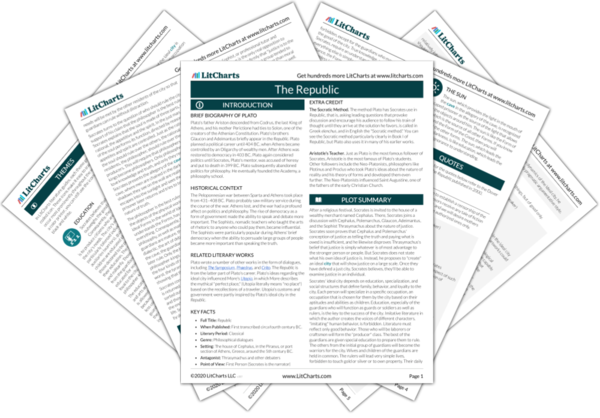Welcome to the LitCharts study guide on Plato's The Republic. Created by the original team behind SparkNotes, LitCharts are the world's best literature guides.
The Republic: Introduction
The Republic: Plot Summary
The Republic: Detailed Summary & Analysis
The Republic: Themes
The Republic: Quotes
The Republic: Characters
The Republic: Symbols
The Republic: Literary Devices
The Republic: Theme Wheel
Brief Biography of Plato

Historical Context of The Republic
Other Books Related to The Republic
Key Facts about The Republic
- Full Title: Republic
- When Published: First transcribed circa fourth century BC.
- Literary Period: Classical
- Genre: Philosophical dialogues
- Setting: The house of Cephalus, in the Piraeus, or port section of Athens, Greece, around the 5th century BC.
- Antagonist: Thrasymachus and other debaters
- Point of View: First Person (Socrates is the narrator)
Extra Credit for The Republic
The Socratic Method. The method Plato has Socrates use in Republic, that is, asking leading questions that provoke discussion and encourage his audience to follow his train of thought until they arrive at the solution he favors, is called in Greek elenchus, and in English the "Socratic method." You can see the Socratic method particularly clearly in Book I of Republic, but Plato also uses it in many of his earlier works.
Aristotle's Teacher. Just as Plato is the most famous follower of Socrates, Aristotle is the most famous of Plato's students. Other followers include the Neo-Platonists, philosophers like Plotinus and Proclus who took Plato's ideas about the nature of reality and his theory of forms and developed them even further. The Neo-Platonists influenced Saint Augustine, one of the fathers of the early Christian Church.







